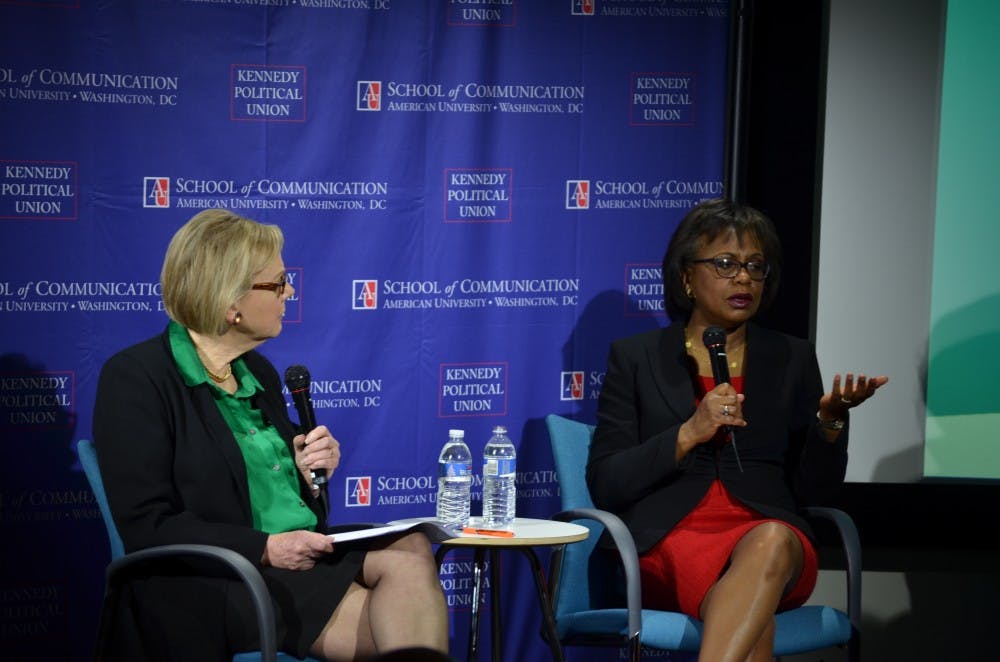Sexual harassment and assault prevention activist Anita Hill spoke to students on April 7 about her 1991 testimony against Supreme Court justice nominee Clarence Thomas in which she accused him of sexual harassment. The event came eight days prior to the release of “Confirmation,” HBO’s upcoming film documenting the trial, in which Hill is played by Kerry Washington.
Hill took center stage in American politics in 1991 after her name was presented to Senate members regarding sexual harassment rumors against Thomas, a Supreme Court justice nominee at the time. According to Hill, after taking the time to figure out how to present her testimony most effectively and with integrity, she went before the committee.
“Honestly, I testified because I knew the integrity of the Court was at stake,” Hill said during the event. “The integrity of the [Supreme] Court is only as good as the people who sit on it, and Clarence Thomas was to be confirmed for a lifetime appointment on the court, and, to me, when you sexually harass someone, that disqualifies you because you will ultimately be in judgement of cases just like that.”
Although the committee ruled in favor of Thomas, Hill’s statements during the hearing prompted conversations on gender equality and sexual assault in different environments, including college campuses.
The Kennedy Political Union showed a scene from the movie during the event where Thomas, played by Wendell Pierce, describes the allegations against him as a “high-tech lynching” of black men by black women. According to Hill, his statement painted black women in a historically inaccurate way, ignored the history of sexual abuse against them and contributed to the all-white, male committee ruling out of ignorance and in favor of their own gender.
“To ignore the history of sexual abuse of black women, I think really again, takes us out of any conversation,” Hill said. “It de-legitimizes our word. It puts us in a position of being either unbelievable or irrelevant. I think that’s really where the real disservice happened.”
As the event moderator, School of Communications professor Jane Hall, discussed, Hill also lacked support from Democrats on the committee and was portrayed outside of the hearings as being a “scorned woman” and suffering from “erotomania” by committee republicans.
Hill said she thinks the Senate judiciary committee was unprepared to deal with the issue of sexual harassment in any capacity, specifically due to a lack of precedent and a mindset of male superiority.
“I don’t think they were willing to deal with the issue of sexual harassment of any woman. They still, I think, believe somewhere that powerful men are entitled,” Hill said regarding the trial. “I think we have to understand that all women live a racial experience and that my race did come into play, but in terms of ability to deal with the issue of sexual harassment, they just weren’t ready for it.”
While more women have since become involved in U.S. politics, Hill said that the lack of female and racial representation is still a problem and needs to be improved to ensure that minority voices are heard.
In addition to gender inequality, the discussion also largely focused on sexual harassment and assault, directed by questions submitted from students prior to the event.
According to Hill, this ongoing disregard for those who come forward about sexual assault and harassment stems from a distrust in victims to be truthful about their experiences and a hesitation to punish perpetrators due to long-term potential consequences.
“We discredit women and then we devalue them, and it happens not just to women, it happens to men who are affected by sexual assault too,” Hill said. “We’ve got to get out of this mindset of, one, assuming that people can’t be truthful about their experiences and then two, we’ve got to give equal value to the people who come forward.”
Hill, who is currently the senior advisor to the Provost at Brandeis University, also called on educational institutions to step up and create a more accepting climate for victims of sexual assault and harassment to feel comfortable reporting their experiences.
“Some of the more modest numbers about sexual assault numbers on campuses are one in five… If you said one in five students is going to be contacted with a contagious disease that’s going to impact them for the rest of their lives, that’s going to interfere with learning, that may interfere with their well-being and their mental health, it may interfere with their physical health, and this is going to happen, we’d do something about it, wouldn’t we?” Hill said. “We’ve got to be more proactive and when we say that we are a campus that believes in equality, then we have to act like it.”
When asked about what impact “Confirmation” will have on viewers, Hill said she hopes it inspires them to stand up and fight for not only sexual assault, but other issues they are passionate about as well.
“Sexual assault is one issue and it affects far too many people but what I’m starting to understand, is that there are just so many different faces of misogyny,” Hill said. “I hope what people take away from [the movie] is the idea that one person can make change, and that you are that one person, even if you may not think you are.”





